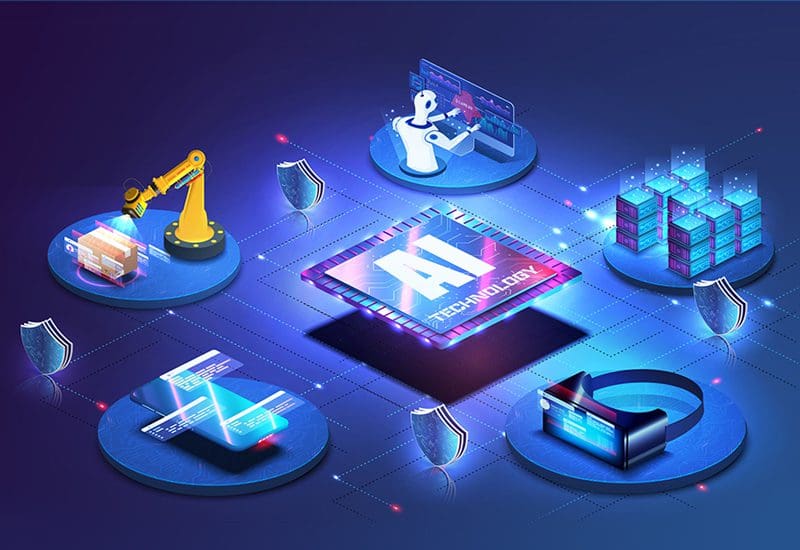What is Artificial Intelligence, and the 8 Ways AI is Impacting Day to Day Life?
Artificial Intelligence Integration Improves Business Offerings and Quality of Life
Kelsey Young, Copywriter and Media Specialist
6 Min Read
The technological innovation we have experienced in the last two decades is nothing short of amazing. There is more technology in the latest smart phones than NASA used to put a man on the moon.
As technology advances there are increasing concerns about technology, such as Artificial Intelligence, replacing humankind.
Artificial Intelligence (AI) may have a bad rapport depending on whom you talk to. Putting aside the conflicting discourse surrounding generative AI, it is easy to assume that AI has no influence over the average person, or their day to day lives.
Such a belief is a fallacy. Artificial Intelligence has seamlessly integrated itself into daily life, improving businesses and quality of life.
But let us take a step back and clarify what Artificial Intelligence (Ai) is and is not.
What is Artificial Intelligence (AI)?

In its base form, AI is an intelligent computer program that can learn. More specifically, AI is a computer system able to mimic human cognitive functions, such as learning, and decision-making. Machine Learning (ML) is the data-drive mathematical model which helps a machine learn without being told.
It is not an automotive system doing the same function repeatedly. If the machine does not need to ‘train’ its brain or ‘learn’ something, it could still be a smart machine, but not AI. Automotive systems function on an algorithm. That algorithm tells the machine to do a function with the same level of efficiency, at regular intervals. For example, the automatic doors at the shopping mall are not AI. They execute one function when a sensor is activated.
There are two main uses of AI. First is to have AI as a type of software. This could be in the form of an application or system that implements an AI algorithm to identify surroundings, assess the data gathered, and develop and execute a solution. The second type of AI looks to its implantation in hardware. These are large assembly-line robots or various drones.
AI software is a tool to be used commercially and personally to automate easy tasks or enhance experiences. It is entirely possible you have used AI without realizing.
8 Everyday Uses for Artificial Intelligence
The average person uses AI multiple times a day. According to Forbes, AI assist in daily activities like:
- Face ID: when a phone or other device unlocks after scanning a face, it uses an AI program. This feature scans over 30 thousand invisible infrared dots on a face. This data is then compared to the data previously determined as the owner’s face.
- Social Media: The algorithms designed for apps like Twitter, Instagram, Facebook, and TikTok all consider your history, interactions, and impressions from previous scrolling sessions to make personalized content recommendations. Machine learning is also beginning to filter through content to address cyber-bullying. Global Data Consultants, LLC (GDC) partners Securly and Linewize are student safety monitoring platforms. They use sophisticated AI to analyze email, social media accounts, Google Drive files, OneDrive files, and web browsing activity to flag concerning activity. Alerts are generated and distributed accordingly.
- Composition: When composing an email or text message, text predictions pop up, giving suggestions about words that come next. This is another form of AI that analyzes the words previously typed before offering logical suggestions. Related to text prediction, is spell check. Programs such as Grammarly or ProWritingAid read over text comparing it to language rules and structures. The AI then suggests corrections to align with the language’s grammar rules.
- Digital Voice Assistants: Smart devices such as Alexa, Google, or Siri are prime examples of AI. Especially when connected to smart devices. Lights, television, coffee pots, and even blinds can all be connected to a smart home system controlled by an AI Device Assistant. This could also be a digital voice assistant on your phone. Cars have voice-activated assistants as well, so hands stay on the steering wheel while driving.
- Call Centers: Yes, the automated voice on the other end of the line is artificial intelligence. However, according to DataConomy, there is an expected increase in companies turning to AI-supported call centers. These algorithms are now sophisticated enough to predict routing and use chatbots to find solutions. Furthermore, call centers have AI-powered agents to speak directly to the customer and they can analyze customer emotions over the phone. Not all companies have made the switch to an AI call center. GDC, for example, provides IT Help Desk Services and support services to clients to enhance customer experiences and increase availability with a full-service 24/7 help desk.
- Recommendations: Speaking of Alexa, online retailers, such as Amazon, use AI algorithms to learn a person’s shopping habits, then recommend products based on the information. The recommendations do not stop at entertainment. Streaming in services such as Netflix, Hulu, or HBO Max will also utilize an AI program to recommend your next favorite show based on your previous activity. This tool can specifically recognize what time of day a person is most likely to view which genres.
- Digital Maps: Applications such as Google Maps, Apple Maps, and Waze use AI to monitor commonly traveled routes for traffic patterns. They then suggest alternative routes if necessary. Now these programs can tag specific inhibitors on a route such as accidents, a car on the side of the road, or a sitting police car.
- Video Games: Be it racing, shooting, role-playing, or strategy games, AI enhances the player experience. Algorithms can analyze and predict a player’s habits. It can generate new tasks to complete or enemies to defeat. It determines what items you would be most likely to pick up.
A Future with Artificial Intelligence
As technology evolves, so will artificial intelligence because the data available which enables machine learning will only become more sophisticated. It will become an invaluable resource to all industries and in every aspect of daily lives.
Moving into 2023, ethical conversations concerning Artificial Intelligence will continue. AI is a tool, as it should always be for either commercial or personal use. When leveraged appropriately, AI can improve productivity and outcomes for your business. According to Forbes, there are three points to consider before making the choice to invest in AI.
First, is to surround yourself with experts. While information is readily available, AI is one of the most talked about technologies. Therefore, conversations surrounding AI can have misleading information. Hire and consult with individuals who train for dealing with these types of technologies. Second, make sure your AI is a way to implement a plan to help achieve your business objectives. Finally, collaborate with reputable service providers and data sets. To follow data security best practices, you are going to want to have trust in the companies with whom you collaborate.




